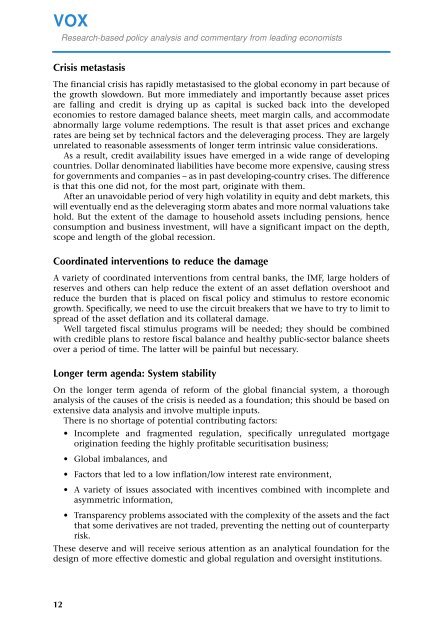What G20 Leaders Must Do To Stabilise our Economy and Fix ... - Vox
What G20 Leaders Must Do To Stabilise our Economy and Fix ... - Vox
What G20 Leaders Must Do To Stabilise our Economy and Fix ... - Vox
Create successful ePaper yourself
Turn your PDF publications into a flip-book with our unique Google optimized e-Paper software.
VOXResearch-based policy analysis <strong>and</strong> commentary from leading economistsCrisis metastasisThe financial crisis has rapidly metastasised to the global economy in part because ofthe growth slowdown. But more immediately <strong>and</strong> importantly because asset pricesare falling <strong>and</strong> credit is drying up as capital is sucked back into the developedeconomies to restore damaged balance sheets, meet margin calls, <strong>and</strong> accommodateabnormally large volume redemptions. The result is that asset prices <strong>and</strong> exchangerates are being set by technical factors <strong>and</strong> the deleveraging process. They are largelyunrelated to reasonable assessments of longer term intrinsic value considerations.As a result, credit availability issues have emerged in a wide range of developingcountries. <strong>Do</strong>llar denominated liabilities have become more expensive, causing stressfor governments <strong>and</strong> companies – as in past developing-country crises. The differenceis that this one did not, for the most part, originate with them.After an unavoidable period of very high volatility in equity <strong>and</strong> debt markets, thiswill eventually end as the deleveraging storm abates <strong>and</strong> more normal valuations takehold. But the extent of the damage to household assets including pensions, henceconsumption <strong>and</strong> business investment, will have a significant impact on the depth,scope <strong>and</strong> length of the global recession.Coordinated interventions to reduce the damageA variety of coordinated interventions from central banks, the IMF, large holders ofreserves <strong>and</strong> others can help reduce the extent of an asset deflation overshoot <strong>and</strong>reduce the burden that is placed on fiscal policy <strong>and</strong> stimulus to restore economicgrowth. Specifically, we need to use the circuit breakers that we have to try to limit tospread of the asset deflation <strong>and</strong> its collateral damage.Well targeted fiscal stimulus programs will be needed; they should be combinedwith credible plans to restore fiscal balance <strong>and</strong> healthy public-sector balance sheetsover a period of time. The latter will be painful but necessary.Longer term agenda: System stabilityOn the longer term agenda of reform of the global financial system, a thoroughanalysis of the causes of the crisis is needed as a foundation; this should be based onextensive data analysis <strong>and</strong> involve multiple inputs.There is no shortage of potential contributing factors:• Incomplete <strong>and</strong> fragmented regulation, specifically unregulated mortgageorigination feeding the highly profitable securitisation business;• Global imbalances, <strong>and</strong>• Factors that led to a low inflation/low interest rate environment,• A variety of issues associated with incentives combined with incomplete <strong>and</strong>asymmetric information,• Transparency problems associated with the complexity of the assets <strong>and</strong> the factthat some derivatives are not traded, preventing the netting out of counterpartyrisk.These deserve <strong>and</strong> will receive serious attention as an analytical foundation for thedesign of more effective domestic <strong>and</strong> global regulation <strong>and</strong> oversight institutions.12














